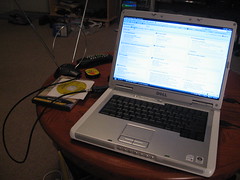My writeups have been a bit delayed, mostly due to traveling complications. But, back to the grindstone:
I missed the start of Peter Morville’s talk on “Ambient Findability: Librarians, Libraries, and the Internet of Thingsâ€, but here’s what I did get. His whole presentation is online here:
Important questions to ask when designing a website:
- Can users find our website?
- Can users find their way around our website?
- Can users find information despite our website?
Credibility and findability are interlinked as concepts – whatever links show up as the top Google results, users tend to trust as being authoritative. I’d never thought about this before, but it makes a lot of sense – I know that mindset is how I react when doing casual searches.
Then, there are also long tail searches. Peter once worked on a redesign of Cancer.gov. Most of their traffic came from search engines linking in to their central page that directs users to info on different types of cancer. After the redesign, all of those individually linked pages show up more prominently in search results – getting the user to the page they want faster, even if that distributes the stats among lots of pages. Our goal is to make information accessible, not just make a website. Search engine optimization is absolutely crucial.
The CSA search interface was greatly simplified in the recent past. This was done to ease choices for students and professors, and not intimidate them so much. But, what if the student or professor doesn’t know the database exists in the first place? Sites such as AccessMyLibrary.com have put the metadata for a number of journal articles online, in the hopes that they’ll show up in Google searches and then be able to link a user to the article via their local library. A good idea! Unfortunately, the Google results for this metadata are in “Google Hell†– so low on the list that they might as well not exist.
Web designers need to remember that we’re designing the legacy systems of tomorrow – learn from the past, design for the future.
The definition of ambient findability is being able to find anything at any time. This is unattainable, but an ideal we should strive for.
“A wealth of information creates a poverty of attentionâ€. There are simply too many options out there for readers to assimilate them all. So, we need to be more findable – a pull model instead of pushing content out.
Meanwhile, there are small steps into making information ambient via alternate interfaces. Peter mentioned the “ambient pinwheel†– it sits on your desk and spins faster as more e-mails accumulate in your inbox.
“Bigger needles need to be put in the haystacks†– I like this metaphor a lot.
The internet turned everyone into a librarian – at least as far as paying attention to metadata creation. Tagging is a prime example. We should bring the new and the old together.
Peter closed with a story about three stonecutters working on the same project. When asked what they were doing, one replied: “Making a living.†The second said “The best job I canâ€. The third said “I’m building a cathedralâ€. Try to keep that broad, grand view when designing any kind of information architecture.

 After almost four years with my last computer (A Dell Inspiron 5100 which held up remarkably well) I finally upgraded! I decided not to mess with success, and bought another Dell laptop – an E1505 this time.
After almost four years with my last computer (A Dell Inspiron 5100 which held up remarkably well) I finally upgraded! I decided not to mess with success, and bought another Dell laptop – an E1505 this time.